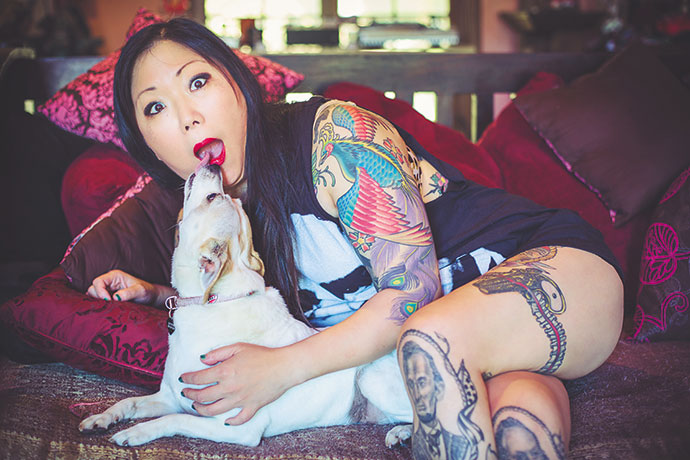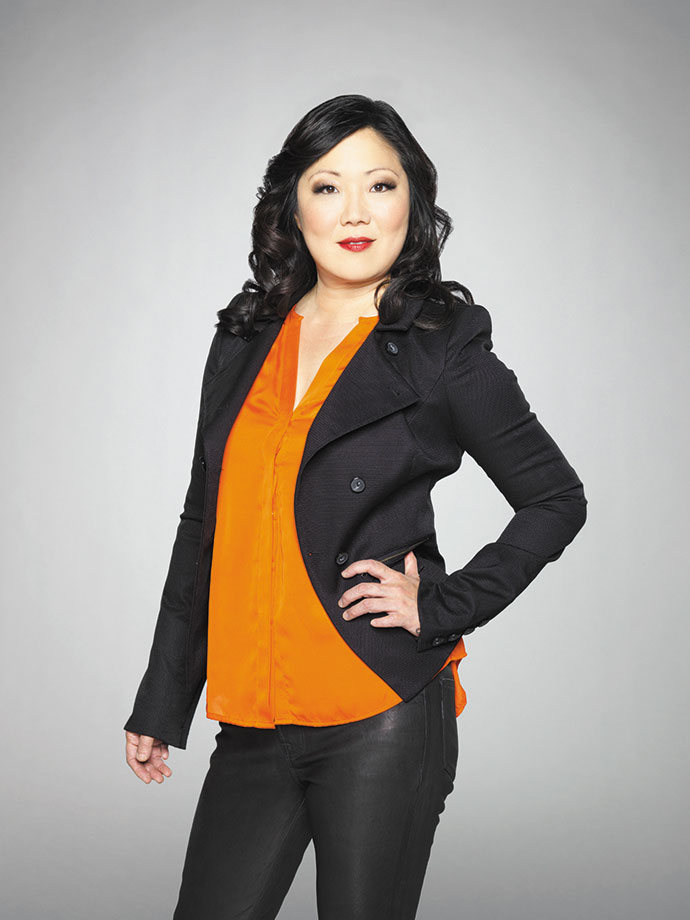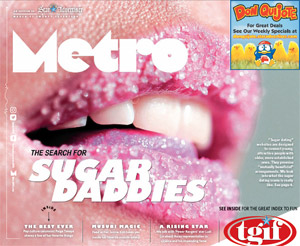There is no ‘I’ in team, but there is a “CHO” in psycho
Lewd behavior and vulgar speech is nothing new for comedienne Margaret Cho — when she’s on stage. Tackling topics that include gender, sexuality, feminism and body sovereignty, her content is downright hilarious at face value. But a closer look reveals a darker history behind the laughs.
Catch her Nov. 6 at Blaisdell Concert Hall as part of The psy-CHO Tour, which already has hit cities including Portland, Chicago and her hometown of San Francisco. This winter, psyCHO also will be found on stages across Europe.
According to the three-time Grammy and Emmy nominee: “This show is about insanity and about the anger I feel about everything happening in the world right now, from police brutality to racism to the rising tide of violence against women. It makes me all so crazy — hence the title: The psyCHO Tour. There is no ‘I’ in team, but there is a ‘CHO’ in psycho. When men go off on something, they are ‘passionate and driven’ — and when women go off on something, we are ‘hysterical and crazy.’ I’m trying to bring some joy to the hysteria and insanity.”
Metro recently had a chance to catch up with Cho and learn more about why she got into comedy, her past traumas and the tour.
The way you are on stage, is that how you are in real life?
No. I’m very shy. I sort of find what I do as a performer very draining. I had to invent that persona you see on stage. When I was really young and starting comedy, it was hard to be taken seriously at a very young age as an American woman. It was all white men doing shows with me. I had to find a way to locate my strength. I had to invent that strength. As an ajumma (a Korean word sometimes used to describe a middle-aged, domineering woman) now, it comes very easily, but not as a 13-year-old girl.

Cho with her dog, Gudrun. Cho, who loves dogs, wrote a song called ‘Hey Big Dog’ featuring Fiona Apple for her 2010 album, ‘Cho Dependent’
How did your past life experiences shape your career as an entertainer?
For me, being a comedian came from not wanting to suffer from being bullied or sexual abuse. On stage, I had witnesses. I was protected by the gaze of the audience. Therefore, I was sort of able to go up safely, even though I was still a kid (when I started). I felt a lot safer in a comedy club than at school or with my family. Comedy was the best, strongest thing I could do with myself. It still is. And I can help other people to survive and bring eloquence to their suffering.
I’ve noticed you have a lot of interesting tattoos. What’s the meaning behind them?
The act of being tattooed, for me, is really something that’s out of the love that I have for all of the artists that have tattooed me. It’s the reclaiming of my own body through having suffered so many years of eating disorders and body hatred, and also sexual abuse. I’m claiming my body through tattooing. It’s a way for me to express my healing.
When did your healing begin?
It was an unconscious thing that comes with maturity. I don’t think I ever made a particular decision, but it’s where I’m at now, reminding myself of my own self-destructive tendencies. I realize that self-destruction is internalized. Abuse and hatred are internalized … (Now), it’s more about acceptance and using my work and experience to do something positive.
What would you say to people who think that your performances are too vulgar and too open?
It is what it is. That’s part of the excitement. Vulgarity for me is a kind of poetry; it’s sort of the trade. What I do best is vulgar comedy.
How do your parents feel about your career?
They didn’t like it. But what’s great now is that they really love it. They just never could have foreseen the kind of success I have now. They’re incredibly proud of my work and the way that I’ve been embraced by American television and the comedy industry, and my ability to perform all over the world.
Tell me more about your upbringing.
What helps me be more outgoing and forthright is that I’m constantly going against my own upbringing. It’s a rejection of what I was born to do. Now, I’m an ajumma. I’m an ajumma all the way. One of the traits of an ajumma is that she says whatever she wants to. She doesn’t care what people think. Coming into that time of my life is really powerful, too. My style now as an artist embraces more of my Korean-ness than it ever has. I truly did become that mean old lady, which is great for comedy.
Can you speak a little bit of your television roles?
It’s so fun and so exciting. I love to be unrecognizable in these characters (like 30 Rock’s Kim Jong-Il and Kim Jong-Un). (Cho also appears in the comedy series Drop Dead Diva as Teri Lee.) I would love to do more acting. For me, it’s very exciting to play different kinds of people. I’m doing a lot more producing in television, more writing.
What can Honolulu expect at your upcoming show?
I’m excited about my show, because it changes daily based on what’s happening in the news and what’s happening in my own life. It’ll be significantly different in Hawaii. It’s such an Asian-American crowd, and I finally get to experience being in the majority for once. I’ll be talking a lot about Donald Trump and what bothers me about him so much. I think he’s horrible. He’s such a racist and sexist. He sexualizes his own daughter. Who does he think he is? Woody Allen? (laughs) There’s a lot in (the show) about how this older generation of comedians really shaped comedy, and messed up comedy. I’m trying to make it right again.
MARGARET CHO’S THE PSYCHO TOUR COMES TO NEAL BLAISDELL CONCERT HALL AT 8 P.M. NOV. 6. TICKETS RANGE FROM $45 TO $65. FOR MORE INFORMATION AND TO PURCHASE TICKETS, VISIT BLAISDELLCENTER.COM.


